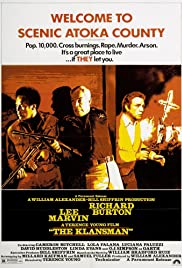
THE KLANSMAN
US, 1974, 112 minutes, Colour.
Lee Marvin, Richard Burton, Cameron Mitchell, O.J. Simpson, Lola Falana.
Directed by Terence Young.
The Klansman is a rough film and brutal. The Ku Klux Klan is a fascinatingly repellent example of racial prejudice, self-righteousness and hysterical violence - all of which is visualised in this look at a modern Alabama town, its sheriff (Lee Marvin), its detached observer (Richard Burton), its bullies, its white trash, its African Americans and Civil Righters. The film shows the ugly behaviour consequent upon the assumption that Right is Might and the ultimate senseless destruction. The film is not strong on probing reasons or exploring the nature of these sick aspects of American society. It rather thrusts its story and incidents bluntly at the audience.
The first American full-length feature film was D.W.Griffith's Birth of a Nation which was based on a novel called The Klansman. Aspects of Birth of a Nation are racist.
1. The focus of the title on the Klan and on the sheriff,, Bascombe? Bascombe as the focus of the issues in the town his part in the Klan his maintenance of the status quo, the violent crisis at the end? The title as focussing the themes in modern America?
2. The importance of the setting: the details of the way of life in the town Alabama and the south, people and the atmosphere? The characters in the town? The mayor, the sheriff. his deputy the Klan, the ordinary whites the blacks the recluse? The isolation of the Alabama towns and yet the invasion of demonstrators from the north? Was this convincing and a convincing backdrop for clashes and crises?
3. The character of Bascombe: initially seeing him at work his background of the Klan, his change of mind. a man of the south, his eye for compromise for doing his job? His interaction with Stancill? His reaction to the rapes his telling Loretta not to tell the truth? The clashes with his deputy and his despising him? The twisting of the truth the protection of the town? Ultimately the need to make decisions? His stance in the battle? What happened to him in his racial attitudes throughout the film? A symbol of a cross-section of American men? How convincing? A character? Or a fictional character?
4. The contrast with Stancill? His wealthy background, his record in the war, the fact that he was a recluse? His allowing the negroes to settle on his mountain? His scepticism about people's attitudes? His ability to despise people? His taking in of Nancy and intention to marry her? His sympathy for Loretta and her grandmother? His involvement in the fight at the railway station? His having to take a stand in battle? His awareness of his death? The significance of his death?
5. The film's portrayal of the Klan and its violence? Audience response to this? The power of the Klan and the resorting to violence?
6. The Klan as symbolizing the south and its assumption that it is right., the self-righteousness? The film's presentation and exploration of this self-righteousness? The reaction to the people from the north?
7. Butt Cut Cates? The bullying deputy? Trading on his friends and marriage relationships? The violence of the rape? His cowardliness? His strength in numbers in the final battle? The irony that he does the killing?
8. The presentation of the mayor and the other men of the town? The hold of the Klan? Avoiding trouble? Avoiding the truth, for instance of the rape? The hostility to people from the north? Isolationist and narrow attitudes?
9. Nancy as a focus for the initial violence? Her rape? Her being ostracised? The scene in the church? (The self-righteous religious overtones of the people?) Her refuge with Stancill? Respect and love from him? Her leaving the town?
10. Loretta and the modern negress making her way in the world? Her conscience and returning to the south? Her love for her grandmother? The significance of the rape and her reaction? The silence? Stancill's attitude,, Bascombe's attitude?
11. Willie Washington and the false accusation? The wife telling the truth? The murder of the two negroes? The castration? As reason enough for Garth's revenge? His militancy and the murders? Did he have the right to execute this justice? In this town? The wider repercussions, for instance, at the demonstration? His stance in the final battle? The fact that he survives?
12. The atmosphere of death and revenge, the battle and a war? In connection with the demonstration and the threats? Audience response to this - in America, outside America?
13. The ultimate futility of so much violence and death? Is this the heritage of America? What can be done? Did the film suggest positive lines of approach to these American problems?